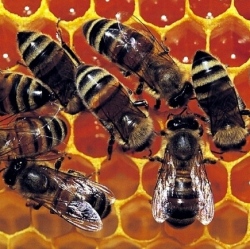
New measures are needed to stop diseases carried by commercial bees spilling over into the wild, says a University of Exeter team. Evidence suggests bees bred in captivity can carry diseases that could be a risk to native species. Bees are used commercially to pollinate crops such as peppers and oilseed rape.
Species of bees used for this purpose, or in commercial hives, are known to suffer from parasite infections and more than 20 viruses. Many of these can also infect wild bumble bees, wasps, ants and hoverflies. The study, published in the Journal of Applied Ecology, reviewed data from existing studies to look at the potential for diseases to jump from commercial bees to insects in the wild.
"Our study highlights the importance of preventing the release of diseased commercial pollinators into the wild," said lead researcher Dr Lena Wilfert. "The diseases carried by commercial species affect a wide range of wild pollinators but their spread can be avoided by improved monitoring and management practices. "Commercial honey beekeepers have a responsibility to protect ecologically and economically important wild pollinator communities from disease."
